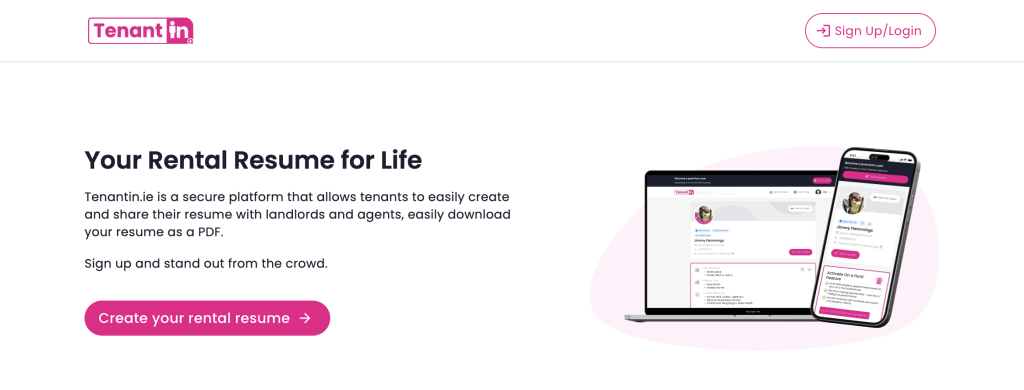If you’re renting in Ireland or planning to, you’ve likely come across the term Rent Pressure Zone. It’s a key factor affecting rent prices and tenant rights, yet many renters still don’t fully understand what it means. Whether you’re building a tenant resume or simply trying to make sense of rental history requirements, knowing how Rent Pressure Zones (RPZs) work can make a real difference in your search.
In this blog, we break down everything tenants need to know about RPZs and how they impact renting in Ireland.
What Is a Rent Pressure Zone?
A Rent Pressure Zone is a designated area in Ireland where rents cannot rise above a set rate each year. These zones were introduced by the Residential Tenancies Board (RTB) to help tackle rapidly increasing rental prices in high-demand areas.
Under current legislation, if your rental is within an RPZ, your landlord is limited in how much they can increase your rent annually. This is especially important for those keeping track of their rental history, as sudden rent jumps can affect budgeting and long-term planning.
Whether you’re building a tenant resume or simply trying to make sense of rental history requirements, knowing how Rent Pressure Zones (RPZs) work can make a real difference in your search.
Start by creating your free Tenantin resume it only takes a few minutes and helps you stand out to landlords right away.
Why Were Rent Pressure Zones Introduced?
The Irish rental market has faced enormous pressure over the last decade. Rents in urban areas, especially in Dublin and surrounding counties, skyrocketed due to limited supply and growing demand. To protect tenants from unaffordable rent hikes, the government introduced RPZs as a temporary measure, which has since been extended and expanded across the country.
Today, the majority of Ireland is included in Rent Pressure Zones, making it vital that tenants understand how they work.
Where Are the Rent Pressure Zones in Ireland?

As of recent updates, the entire country has now been designated as a Rent Pressure Zone. This means all private residential rentals in Ireland are subject to rent increase restrictions unless the property is exempt.
You can check the status of a property through the RTB or by asking the landlord directly. This is especially useful information to include in your tenant profile, so landlords know you’re informed and prepared.
How Do Rent Pressure Zones Affect Rent Increases?
In an RPZ, rent increases are capped at 2 percent per year or in line with the Harmonised Index of Consumer Prices (HICP), whichever is lower. This helps tenants by ensuring stability and predictability in rent payments.
For tenants with a solid rental history, it provides some peace of mind knowing their rent won’t spike unexpectedly. This can also work in your favour when presenting a tenant resume to a new landlord, as it shows consistency and planning.
Key points:
- Rent cannot increase more than once every 12 months.
- Landlords must give 90 days’ notice before increasing rent.
- Rent increases must follow the RPZ formula unless an exemption applies.
Are There Any Exemptions?
Yes, not every property in an RPZ is subject to the rent cap. Some of the most common exemptions include:
- New builds that have not been rented in the past two years.
- Substantial renovations that significantly upgrade the property.
- Properties that were not rented in the two years prior to the tenancy starting.
If you’re renting in Ireland, it’s important to check whether the property you’re applying for qualifies for exemption. Including this information in your communication with landlords can position you as a proactive and informed tenant.
Why Does This Matter for Tenants?
Understanding Rent Pressure Zones helps you take control of your rental journey. It allows you to:
- Budget accurately and plan long-term.
- Avoid overpaying or being taken advantage of.
- Be more confident when negotiating with landlords.
- Build a strong, informed tenant resume using your rental history.
If you’re using tools like Tenantin.ie to create your tenant profile, including awareness of RPZ rules shows landlords that you’re serious, informed, and responsible.
How Can Tenants Stay Ahead in a Competitive Market?
In a competitive market, standing out to landlords is crucial. While understanding RPZs helps with financial planning, you also need to present yourself in the best possible light.
This is where a free tenant resume from Tenantin.ie can make a difference. With your rental history, employment status, and personal details all in one profile, you can:
- Make faster applications.
- Improve your chances in high-demand areas.
- Show landlords you’re a reliable, professional tenant.
And if you’re struggling to find a place, the On a Hunt premium feature can automate your enquiries and alert you to listings daily, giving you a competitive edge.
Useful Links:
Final Thoughts: Know Your Rights and Be Prepared

The introduction of Rent Pressure Zones has changed the landscape of renting in Ireland. Tenants now have more protection, but only if they understand the system. By knowing your rights, keeping track of your rental history, and using tools like a free resume on Tenantin.ie, you can navigate the rental market with greater confidence and less stress.
Whether you’re new to Ireland, a long-term renter, or just starting your search, staying informed will help you make better decisions — and find a home that works for you.
Frequently Asked Questions
What is a Rent Pressure Zone (RPZ)?
An RPZ is an area where rents are rising rapidly, and specific regulations limit the amount by which landlords can increase rent. These zones are designated to help maintain more stable and affordable rental conditions.
How are RPZs determined?
The Irish government defines RPZs based on specific criteria, including rent levels and the rate of rent increases within a specified period. Areas with significant increases in rent prices compared to national averages may be designated as RPZs.
How do RPZs affect rent increases?
In an RPZ, landlords are generally restricted to increasing rent by no more than 4% annually. This cap aims to provide predictability and affordability for tenants while discouraging excessive rent hikes.
Are all areas in Ireland covered by RPZs?
No, not all areas in Ireland fall under RPZ regulations. The designation is specifically applied to areas experiencing high demand and fast-rising rents. Checking current RPZ listings on reliable platforms like tenantin.ie can provide updated information on which areas are covered.
How long does an RPZ designation last?
RPZ designations can last for several years, but they are subject to review. The Housing Agency regularly assesses these areas to determine if their status should continue or be revoked based on current market conditions.
Can a landlord ever raise rent by more than 4% in an RPZ?
In most cases, the 4% cap applies strictly; however, exceptions exist if significant improvements have been made to the property that enhances its value or utility substantially. Such cases must meet specific criteria outlined by housing authorities.
How can I find out if my rented property is in an RPZ?
You can check whether your property is in an RPZ by using online resources like tenantin.ie, which provides up-to-date information on designated zones across Ireland.
What should I do if my landlord raises the rent beyond legal limits in an RPZ?
If you suspect your landlord has raised the rent unlawfully, you can seek advice from the Residential Tenancies Board (RTB) or use resources provided by tenantin.ie for guidance on addressing the issue.
Does being in an RPZ affect lease agreements or renewals?
While being in an RPZ primarily influences rent increases, it does not change other aspects of lease agreements directly. Tenants should review their lease terms carefully and understand their rights regarding renewals and terminations.
Can new properties be exempt from RPZ rules?
Yes, newly built properties or those substantially refurbished may be exempt from RPZ rules under certain conditions for a limited time. This exemption aims to encourage investment in new housing stock while maintaining overall market stability.
For further detailed insights on Rent Pressure Zones and their implications for tenants, visit tenantin.ie, where you can find comprehensive resources tailored for renters across Ireland.






